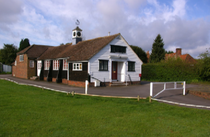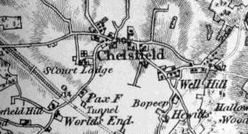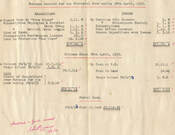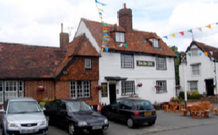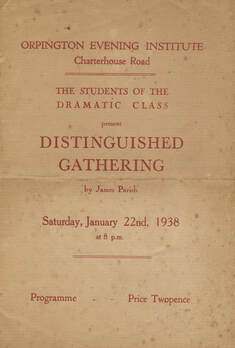 The oldest existing programme, from the Society’s second performance in 1938
The oldest existing programme, from the Society’s second performance in 1938
Building work on the Chelsfield Park Estate began in the early 1930s and many young couples bought the houses. They wanted to do something to bring the new community together, so play readings took place in each other’s houses.
Early members included Ellen and Colin George, the Fredricks, Eric Hart, Bunty Orme, Vernon Tomalin, Teddy Hollands and Bill Loraine, most of whom would remain involved until the 1950s and in some cases beyond. Mabel Fredrick had a play room built to seat about 50 people with the audience on raised benches, so the cast had the audience at their feet. Eric Hart usually took on the role of producer (the Players did not adopt the more modern term ‘director’ until the 1990s). Ellen was the first Secretary.
The first play the Players presented was 20th Century Lullaby in 1936, of which we know almost nothing. Other plays are listed with uncertain dates: we know that they happened, but we are not entirely sure when. There were at least nine shows between 1939 and 1947, but there are very few to which we can ascribe a certain date.
The Players put on plays during the war even while bombs dropped, and productions took place in many different venues such as Joan and Ivan Taylor’s Church Society Hall, St Mary’s Church Hall, Pratts Bottom Village Hall, Orpington Civic Hall and somewhere on Charterhouse Road (possibly the church hall but more likely the school). There were also outdoor productions such as Hassan, performed just before the outbreak of war and for a while lost to history, in that it doesn’t appear in the official list of productions but photos and newspaper reviews have since emerged. Another missing play is The Madonna, cited on the back of playbills as being performed in 1936 but disappearing from the list in 1988.
At this time the Players were known as the Chelsfield Village Hall Dramatic Society, even though there was as yet no village hall, which explains the variety of venues. It was not until 1949 that the group became known as the Chelsfield Players, dropping “Village Hall” from their name just as the village hall was finally built. However, the original name did reappear occasionally as late as the 1960s.
Local squire Mr Waring was against the idea of a village hall, but the Players started a fund anyway and asked other groups, such as the Women’s Institute, to join them. The hall was duly constructed and opened in 1953 but had to be rebuilt after a fire in March 1954 during the dress rehearsal of Martine.
Contemporary newspaper cuttings assert that Chelsfield had a strong reputation for quality shows in its early years and was the best society in the area, although the group seems to have gone into abeyance in around 1957, returning soon afterwards to further positive reviews but with radically different personnel.
The BBC radio DJ and theatre enthusiast Brian Matthew joined at this time, reviving the Society and bringing in experienced actors from outside. One such, Arthur White, was involved with the Pilgrim Little Theatre – which Matthew set up towards the end of his time with the Players – though he never appeared on the Chelsfield stage. However, his brother David White (later known professionally as David Jason) appeared for the Players in Rookery Nook in 1965. The part of leading lady was usually reserved for Pamela Matthew, with Brian Matthew more often than not taking the role of leading man. Indeed, every play between 1958 and 1966 was directed by Brian (or occasionally Pamela), with the pair usually taking major roles as well.
Reviews were almost always glowingly complimentary during the Matthew years, but it all came to an acrimonious end in 1966 when, with Brian and Pamela away on holiday, the Committee cancelled Brian’s plans for a charity performance of The Young Elizabeth. Brian was upset that the Committee had gone behind his back, while the Committee claimed that Brian had organised the performance behind their backs. Both versions are probably true. In proper amdram style, Brian and Pamela flounced off to make the Pilgrim Little Theatre their main theatrical endeavour. Brian, together with Brian Epstein (yes, that Brian Epstein), had previously planned to build a new theatre on green-belt land near Downe, but in July 1965 Bromley Council refused planning permission. Brian then built his own theatre in the grounds of his Chelsfield Hill home. Neither Brian nor Pamela had any dealings with the Players again.
With the Society facing oblivion for the second time in less than a decade, Norman Nash took on the role of Producer/Director; a role afterwards taken by Harold Hart, both of whom had been with the Society since the 1940s. The Players came close to folding again when Harold decided to stop directing, putting the spring production of 1980 in jeopardy. At the social at the West Kent Golf club, Ann Blatcher (daughter-in-law of founder member Ellen George and previously mainly involved with box office) told the chairman that she would ‘have a go’ and so produced Full Treatment, a play chosen with the assistance of the late Ken Richardson. Those who revitalised the Society in the early 1980s remained the core till the 2010s and in some cases beyond.
From there, a more settled history has seen the Players keep up the variety of drama, comedy, classics and new work, usually producing three shows a year. Through much of the 1990s the society also ran a youth group, while performances at the Edinburgh Fringe began in the 2000s. The Society maintains a close relationship with the Five Bells pub, where members often retire after rehearsals to discuss aspects of the play and grumble about the director.
Early members included Ellen and Colin George, the Fredricks, Eric Hart, Bunty Orme, Vernon Tomalin, Teddy Hollands and Bill Loraine, most of whom would remain involved until the 1950s and in some cases beyond. Mabel Fredrick had a play room built to seat about 50 people with the audience on raised benches, so the cast had the audience at their feet. Eric Hart usually took on the role of producer (the Players did not adopt the more modern term ‘director’ until the 1990s). Ellen was the first Secretary.
The first play the Players presented was 20th Century Lullaby in 1936, of which we know almost nothing. Other plays are listed with uncertain dates: we know that they happened, but we are not entirely sure when. There were at least nine shows between 1939 and 1947, but there are very few to which we can ascribe a certain date.
The Players put on plays during the war even while bombs dropped, and productions took place in many different venues such as Joan and Ivan Taylor’s Church Society Hall, St Mary’s Church Hall, Pratts Bottom Village Hall, Orpington Civic Hall and somewhere on Charterhouse Road (possibly the church hall but more likely the school). There were also outdoor productions such as Hassan, performed just before the outbreak of war and for a while lost to history, in that it doesn’t appear in the official list of productions but photos and newspaper reviews have since emerged. Another missing play is The Madonna, cited on the back of playbills as being performed in 1936 but disappearing from the list in 1988.
At this time the Players were known as the Chelsfield Village Hall Dramatic Society, even though there was as yet no village hall, which explains the variety of venues. It was not until 1949 that the group became known as the Chelsfield Players, dropping “Village Hall” from their name just as the village hall was finally built. However, the original name did reappear occasionally as late as the 1960s.
Local squire Mr Waring was against the idea of a village hall, but the Players started a fund anyway and asked other groups, such as the Women’s Institute, to join them. The hall was duly constructed and opened in 1953 but had to be rebuilt after a fire in March 1954 during the dress rehearsal of Martine.
Contemporary newspaper cuttings assert that Chelsfield had a strong reputation for quality shows in its early years and was the best society in the area, although the group seems to have gone into abeyance in around 1957, returning soon afterwards to further positive reviews but with radically different personnel.
The BBC radio DJ and theatre enthusiast Brian Matthew joined at this time, reviving the Society and bringing in experienced actors from outside. One such, Arthur White, was involved with the Pilgrim Little Theatre – which Matthew set up towards the end of his time with the Players – though he never appeared on the Chelsfield stage. However, his brother David White (later known professionally as David Jason) appeared for the Players in Rookery Nook in 1965. The part of leading lady was usually reserved for Pamela Matthew, with Brian Matthew more often than not taking the role of leading man. Indeed, every play between 1958 and 1966 was directed by Brian (or occasionally Pamela), with the pair usually taking major roles as well.
Reviews were almost always glowingly complimentary during the Matthew years, but it all came to an acrimonious end in 1966 when, with Brian and Pamela away on holiday, the Committee cancelled Brian’s plans for a charity performance of The Young Elizabeth. Brian was upset that the Committee had gone behind his back, while the Committee claimed that Brian had organised the performance behind their backs. Both versions are probably true. In proper amdram style, Brian and Pamela flounced off to make the Pilgrim Little Theatre their main theatrical endeavour. Brian, together with Brian Epstein (yes, that Brian Epstein), had previously planned to build a new theatre on green-belt land near Downe, but in July 1965 Bromley Council refused planning permission. Brian then built his own theatre in the grounds of his Chelsfield Hill home. Neither Brian nor Pamela had any dealings with the Players again.
With the Society facing oblivion for the second time in less than a decade, Norman Nash took on the role of Producer/Director; a role afterwards taken by Harold Hart, both of whom had been with the Society since the 1940s. The Players came close to folding again when Harold decided to stop directing, putting the spring production of 1980 in jeopardy. At the social at the West Kent Golf club, Ann Blatcher (daughter-in-law of founder member Ellen George and previously mainly involved with box office) told the chairman that she would ‘have a go’ and so produced Full Treatment, a play chosen with the assistance of the late Ken Richardson. Those who revitalised the Society in the early 1980s remained the core till the 2010s and in some cases beyond.
From there, a more settled history has seen the Players keep up the variety of drama, comedy, classics and new work, usually producing three shows a year. Through much of the 1990s the society also ran a youth group, while performances at the Edinburgh Fringe began in the 2000s. The Society maintains a close relationship with the Five Bells pub, where members often retire after rehearsals to discuss aspects of the play and grumble about the director.
20 Most prolific actors
Anne Allocca/Finn/Kindley: 76 shows, 1967-present
Keith Wishart: 61 shows, 1981-2019
Philip Lane: 55 shows, 1965-2014
Pat Walls: 55 shows, 1980-present
Cynthia Crabtree/Hearing, 49 shows, 1994-present
Bernard West, 46 shows, 1983-2017
Lestrine Wishart, 43 shows, 1981-2011
Ann Blatcher, 41 shows, 1978-2016
Gladys Hollands, 39 shows, 1939-1971
Patrick Neylan, 38 shows, 2005-present
Jo Clent, 38 shows, 2007-present
Philippa Rooke, 36 shows, 1998-present
Dorothy Freeman, 35 shows, 1958-1979
Madeline McCubbin, 34 shows, 1991-present
Norman Nash, 34 shows, 1945-1976
Philip George, 34 shows, 2002-present
Andrew Haggerty, 31 shows, 2009-present
Emily Kindley/Edmunds, 28 shows, 2000-present
Carl Ash, 27 shows, 1961-1975
Ken Clarke, 27 shows, 2008-present
Anne Allocca/Finn/Kindley: 76 shows, 1967-present
Keith Wishart: 61 shows, 1981-2019
Philip Lane: 55 shows, 1965-2014
Pat Walls: 55 shows, 1980-present
Cynthia Crabtree/Hearing, 49 shows, 1994-present
Bernard West, 46 shows, 1983-2017
Lestrine Wishart, 43 shows, 1981-2011
Ann Blatcher, 41 shows, 1978-2016
Gladys Hollands, 39 shows, 1939-1971
Patrick Neylan, 38 shows, 2005-present
Jo Clent, 38 shows, 2007-present
Philippa Rooke, 36 shows, 1998-present
Dorothy Freeman, 35 shows, 1958-1979
Madeline McCubbin, 34 shows, 1991-present
Norman Nash, 34 shows, 1945-1976
Philip George, 34 shows, 2002-present
Andrew Haggerty, 31 shows, 2009-present
Emily Kindley/Edmunds, 28 shows, 2000-present
Carl Ash, 27 shows, 1961-1975
Ken Clarke, 27 shows, 2008-present
Email
|
